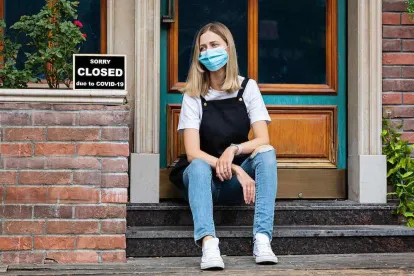Massachusetts Court is the Latest to Hold That Doctrine of Frustration of Purpose Discharges Commercial Tenant's Obligation to Pay Rent
While the pandemic has forced the closure of dozens of restaurants and retail locations across the country, those still serving their communities just received a helping hand from the Massachusetts Superior Court. Just recently, the Superior Court issued a decision with the potential to shape the post-pandemic landlord-tenant relationship over the next several months.
In UMNV 205-207 Newbury, LLC v. Caffé Nero Americas Inc., C.A. No. 2084CV01493-BLS2 (Mass. Super. 2020), the Superior Court held that “[u]nder the doctrine of frustration of purpose, Caffé Nero’s obligation to pay rent was discharged while it was barred from letting customers drink or eat inside the leased premise, at least from 24 March to 22 June 2020. Therefore[,] Caffé Nero did not breach the Lease by not paying rent for this period….”1 Restaurants, retailers, and other tenants in Massachusetts and beyond may now have more leverage in negotiations with landlords as the pandemic continues. Where businesses were forced to close by state and city ordinances, struggling tenants may have an argument that their nonpayment of rent during that time did not breach their leases and any threatened collections or eviction actions are improper. Ultimately, however, the frustration of purpose analysis is highly fact-intensive, and commercial tenants as well as landlords must be aware of how such legal principles apply to their leases and should stay apprised of how courts in their states consider and apply the doctrine depending on the circumstances presented.
BACKGROUND OF THE MASSACHUSETTS SUPERIOR COURT’S CAFFÉ DECISION
Beginning on 1 June 2017, Caffé Nero and UMNV 205-207 Newbury, LLC (UMNV) entered into a 15 year lease for 205-207 Newbury Street “solely” for “[t]he operation of a Caffé Nero themed café under Tenant’s Trade Name and for no other purpose.”2 The lease further required Caffé Nero to offer take-out sales only “from its regular sit-down restaurant menu.”3 However, due to Governor Baker’s 24 March 2020 order prohibiting restaurants from allowing on-premises dining—indoors or outdoors—Caffé Nero temporarily closed its doors for dine-in services and was forced to cease paying rent to its landlord, UMNV. In response and without much negotiation between the parties, UMNV terminated Caffé Nero’s lease and brought a summary process eviction action, alleging that Caffé Nero breached the lease due to nonpayment of rent.
However, just days ago, citing the longstanding frustration of purpose doctrine, the Court held that “Caffé Nero’s continuing obligation to pay rent was discharged at least from 24 March to 22 June, 2020, because the entire purpose of the Lease was completely frustrated while the Governor’s COVID-19 orders barred restaurants from serving customers indoors.”4 The Court explained, “[u]nder the legal doctrine known as ‘frustration of purpose,’ a party to a lease or other contract is excused from performing its contractual obligations ‘when an event neither anticipated nor caused by either party, the risk of which was not allocated by the contract, destroys the object or purpose of the contract, thus destroying the value of performance.’”5 Specifically, the Court concluded that “[f]rustration will similarly discharge an obligation to pay rent where a government order or regulation bars certain conduct or economic activity, it thereby substantially frustrates the principal purpose of the contract, and the non-occurrence of such an order or regulation was a basic assumption underlying the contract.”6 Ultimately, when the doctrine applies, a contracting party’s performance under the contract, i.e., paying rent, is excused.
Applying the frustration of purpose criteria to the facts of this case, the Court concluded, as a matter of law, that the purpose of Caffé Nero’s lease with UMNV was destroyed while the Governor’s COVID-19 orders barred the restaurant from allowing customers to dine inside. Specifically, the Court concluded:
The main object or purpose of this contract is not in dispute. The Lease provides that Caffé Nero could use the leased premises only to operate a café with a sitdown restaurant menu “and for no other purpose.” The entire purpose of the Lease was for Caffé Nero to use space inside the basement or walk-down level of UMNV’s building to serve high quality coffee, other drinks, and food to customers who could sit and consume them on the premises.7
As a result, the Court found that Caffé Nero’s failure to pay rent was excused, and UMNV did not have the right to terminate their lease.
MASSACHUSETTS IS NOT THE ONLY STATE TO CREDIT THIS ARGUMENT
The Massachusetts Superior Court is not the first court (and will not be the last) to grapple with the concept of frustration of purpose—as well as the related principles of impossibility and impracticability—relating to breach of lease actions in the wake of the COVID-19 pandemic.
For example, at the end of 2020, the New York Supreme Court heard a tenant’s argument that its performance of a lease (i.e., rent payments) was excused under various doctrines, including frustration of purpose. The tenant argued that its “primary services involve[d] managing and consulting for a group of restaurants and the shutdown of restaurants renders its business model unprofitable.”8 The Court rejected this argument on 3 December, 2020, distinguishing it from the hypothetical case “where the office space leased was destroyed or where a tenant rented a unique space for a specific purpose that can no longer serve that function.”9
While this decision coming from the Supreme Court of the State of New York rejected the tenant’s defense to lease performance rooted in frustration of purpose, it may signal New York courts’ willingness to acknowledge the application of frustration of purpose where the facts dictate.10 It remains to be seen whether the Court’s decision would have been different for restaurant or retailer tenants “where the tenant rented a unique space for a specific purpose that can no longer serve that function,” such as was the case in Caffé Nero discussed above.
CONCLUSION
While several landlord-tenants have successfully navigated lease modifications during the COVID-19 pandemic, other restaurants, retailers, and tenants face ongoing negotiations with landlords seeking to enforce rent obligations or evict tenants over missed payments during the height of the pandemic. Ultimately, commercial landlords and tenants in Massachusetts, other states across the United States, and even certain countries around the globe must be aware of how the doctrine of frustration of purpose and similar legal concepts may affect their rights and obligations when it comes to commercial leases in the wake of COVID-19. The Caffé Nero decision—and an increasing number of cases across the country—may offer commercial tenants leverage in ongoing negotiations with landlords where they have struggled to meet their rent obligations. However, landlords are not defenseless, as courts are only willing to apply frustration of purpose where the language of and facts surrounding the lease dictate. Ultimately, restaurants, retailers, and commercial tenants and landlords generally must carefully consider and monitor the latest court decisions affecting their legal rights and obligations in ongoing lease negotiations.
1 UMNV 205-207 Newbury, LLC v. Caffé Nero Americas Inc., C.A. No. 2084CV01493-BLS2, at *1 (Mass. Super. Feb. 16, 2021) (Memorandum and Order on Plaintiff’s Motion for Partial Summary Judgment).
2 Id. at 2.
3 Id.
4 Id. at 7.
5 Id. at 5 (citing Chase Precast Corp. v. John J. Paonessa Co., Inc., 409 Mass. 371, 374 (1991)).
6 Id. (citing R & F Fin. Servs., LLC v. Cudd Pressure Control, Inc., C.A. No. 20190287, 2021 WL 99733, at *4–5 (N.D.Jan. 12, 2021); Restatement (Second) of Contracts § 265, comment a, illustration 4 (1981)).
7 Caffé Nero, C.A. No. 2084CV01493-BLS2, at *7.
8 140 Broadway LLC v. Bold Food, LLC, Index No. 652674/2020, NYSCEF Doc. No. 30, at 2 (N.Y. Sup. Ct.).
9 Id. at 3.
10 Id. (“To be clear, the Court takes no position on what circumstances might permit the implication of a frustration of purpose doctrine under a generic office lease.”).




 />i
/>i

